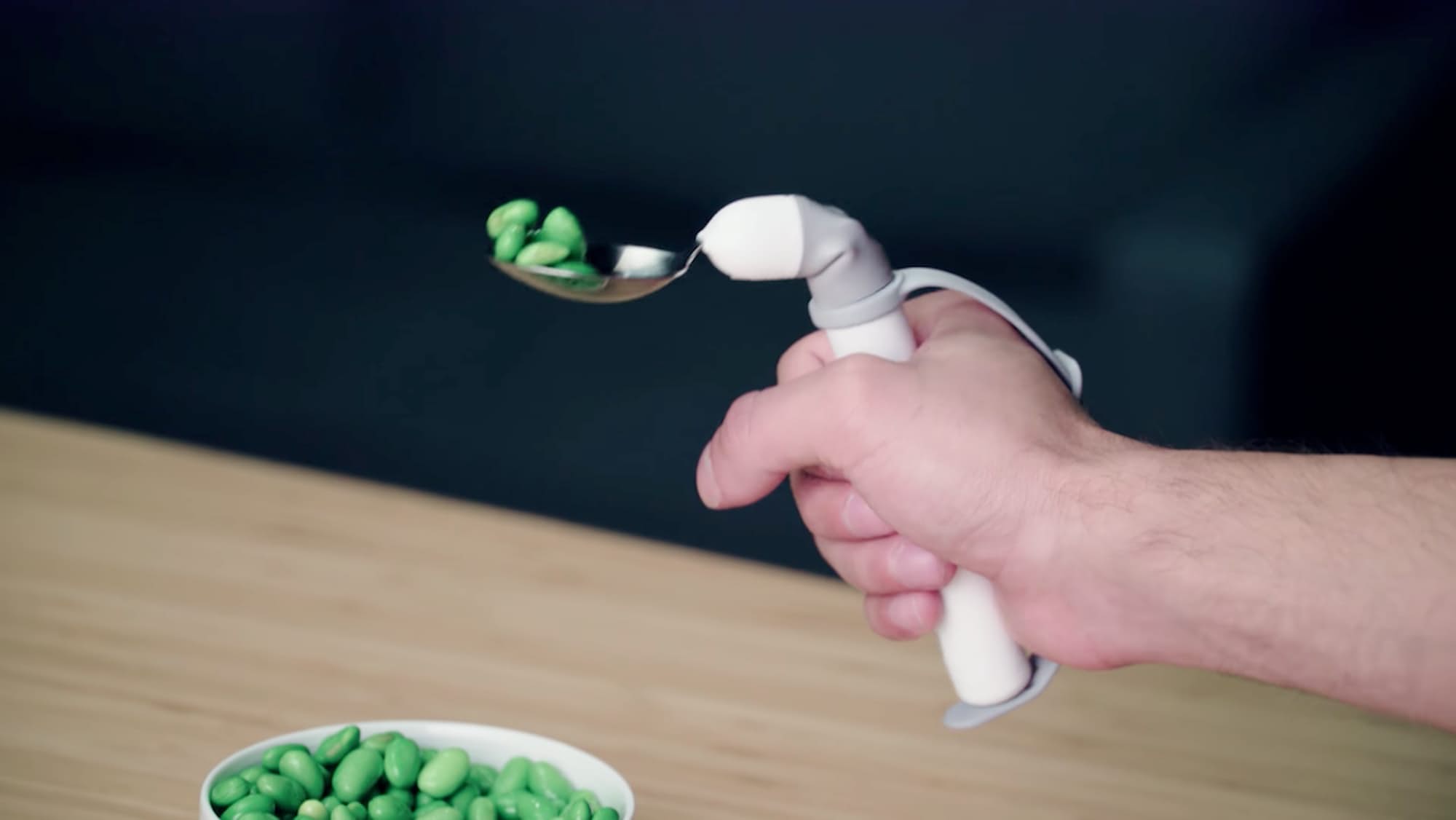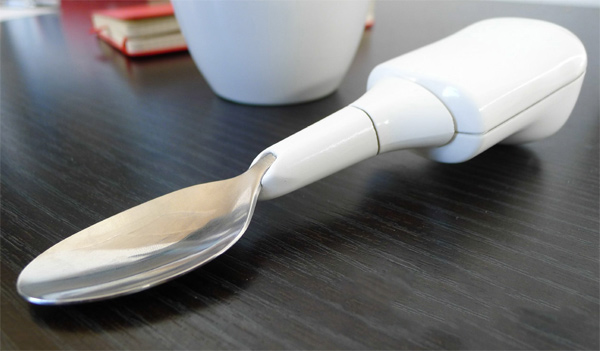Liftware levels playing field for disabled diners

The Liftware Level is a motorized utensil that automatically bends itself to counteract involuntary hand movements, to allow people afflicted with disorders like Parkinson’s and Huntington’s disease to feed themselves. Liftware
Michael Irving, New Atlas December 5, 2016
Most of us may not think twice about how we feed ourselves, but for people with limited movement in their hands and arms, dinnertime can be a frustrating and messy experience. Aimed at those suffering from afflictions like cerebral palsy and Huntington’s disease, the Liftware Level is a motorized utensil that flexes to compensate for a user’s restricted movement so as to keep the utensil head level.
Different disorders can affect a person’s mobility in a variety of ways, and these call for different solutions. The Obi robot arm is designed for those with very little or no mobility in their arms, while Liftware’s first product, now called the Steady, stabilizes the spoon against tremors caused by Parkinson’s disease or essential tremor.

The Liftware Steady is the most practical and effective spoon for people living with Essential Tremor, Parkinson’s, or other disorders.
Like the Steady, the Liftware Level works to counteract unintended movements, but adds two motors that enable the utensil head to automatically flex and stay level for the trip from plate to mouth, regardless of how the user’s arm twists or bends. It does this by sensors in the handle measuring the movements of the user’s hand in three dimensions and then rotating the handle and flexing the head to compensate.

The Liftware Level handle contains sensors that detect movement in three dimensions, and counters them by directing motors to bend a joint, keeping the head steady
Interchangeable attachments mean the Level can serve as a fork or a spoon as needed, and there’s a strap for people who may have trouble keeping a grip on the device. Each charge of the battery will be enough for about three meals, or one hour of use.
“Liftware Level is a utensil designed to specifically address mealtime struggles facing individuals with limited mobility or range of motion,” says Anupam Pathak, Liftware’s creator. “Designed and developed with significant input from physicians and potential users, we hope this new device will turn the everyday task of eating into a more pleasurable experience for more people living with movement disorders.”
The Level is available to order now from Liftware, and the company expects to ship the device before the holidays. The starter kit, which includes the handle, a soup spoon attachment, hand strap, charger and travel pouch, costs US$195, while extra fork and spoon attachments can be added for $34.95 each.
| Introducing Liftware Level. Liftware Level is a new robotic device designed to help people with limited hand and arm mobility hold a utensil at the angle needed to enjoy any meal. Liftware. YouTube Dec 1, 2016 |
| References |
A noninvasive handheld assistive device to accommodate essential tremor: A pilot study, Pathak A, Redmond JA, Allen M, Chou KL. Mov Disord. 2014 May;29(6):838-42. doi: 10.1002/mds.25796. Epub 2013 Dec 27. Full text, PDF
| Further reading |
Shaken not Stirred: A Pilot Study Testing a Gyroscopic Spoon Stabilization Device in Parkinson’s Disease and Tremor, Ryden LE, Matar E, Szeto JYY, Hammond DA, Clouston P, Lewis SJG. Ann Indian Acad Neurol. 2020 May-Jun;23(3):409-411. doi: 10.4103/aian.AIAN_251_19. Epub 2019 Dec 24. Full text, PDF
Adapted Feeding Utensils for People With Parkinson’s-Related or Essential Tremor, Sabari J, Stefanov DG, Chan J, Goed L, Starr J. Am J Occup Ther. 2019 Mar/Apr;73(2):7302205120p1-7302205120p9. doi: 10.5014/ajot.2019.030759.
Also see
Meet Anupam Pathak, Lift Lab’s founder – Google’s smart spoon Economic Times
Shaky hand, stable spoon: U-M study shows device helps essential tremor patients University of Michigan
Verily Life Sciences Launches Liftware™ Level Device to Help People with Limited Hand and Arm Mobility Eat with Confidence Business Wire
